Germany’s justice minister has joined efforts to prepare the ground for significant control of news distribution online, following moves by Chancellor Angela Merkel, calling out social media for “fake news”.
The socialist politician, sitting as justice minister thanks to a grand coalition that sees the centre-right Christian Democrats sharing power with the left, Heiko Maas made the comments ahead of next year’s Bundestag elections.
Mr. Maas said Germany “must reckon” with the proliferation of what he called fake news, and that if unchecked it would influence the election, reports Deutsche Welle.
Again highlighting the German government’s intention to legislate to combat what they see as unwelcome freedom on the internet, Mr. Maas said: “Unfortunately, this is a dark side of the internet, a side we have to deal with more intensively”. He said Germany would call on social media networks like Facebook to reveal how their businesses work.
Facebook has already proven extremely willing to cede to German government demands, deleting 100,000 “hate posts” a month at the behest of the justice minister and others. Mr. Maas has already said that figure is too low.
He had previously said he wanted Facebook and other social media platforms to be considered media publishers, not tech companies, making them legally responsible for the content published on it by ordinary users. Facebook would then be criminally liable, under German law, to remove what the government considered hate-speech.
“In my view they should be treated as media even if they do not correspond to the media concept of television or radio”, he said. A working group meeting in Berlin on the issue called for €1 million fines if Facebook refused to delete a post the government deemed hateful.
Mr. Maas’s comments follow those by Chancellor Merkel, who has now announced she will be running for a fourth term and will see stiff competition from the populist-insurgent, anti-mass migration Alternative for Germany (AfD) party.
Speaking alongside outgoing United States President Barrack Obama, Ms. Merkel made oblique references to the AfD when speaking of how the internet had helped elevate Donald Trump to president-elect. Calling the new interest in nationalist, right-wing politics a “wave” that “engulfs us”, she said: “Look at the European parliament.
“There are a lot of people who are looking for simplistic solutions and are preaching simplistic solutions which are very unfriendly policies. We have them here in Europe, too, we have them in Germany too.”
Calling for stricter controls on the internet, Ms. Merkel continued: “Digitisation is a disruptive technological force that brings about deep-seated change and transformation in society. Look at the history of the printing press, when this was invented what kind of consequences it had. Or industrialisation, what consequences that had.
“Very often, it led to enormous transformational processes within individual societies and it took a while until societies learned to find the right kinds of policies to contain this, to manage and steer this. We live in a period of profound transformation.”
Following this attack on freedom of speech online, Ms. Merkel doubled down last week, using her first address since declaring her intention to run again to say: “Something has changed. As globalization has marched on, debate is taking place in a completely new media environment. Opinions aren’t formed the way they were 25 years ago.”
“Today we have fake sites, bots, trolls – things that regenerate themselves, reinforcing opinions with certain algorithms and we have to learn to deal with them.”

COMMENTS
Please let us know if you're having issues with commenting.